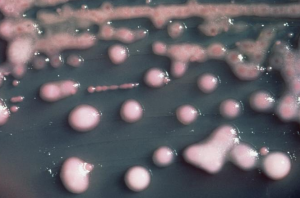NewsDesk @bactiman63
At least 14 newborns at the Kenyatta National Hospital in Nairobi have contracted multidrug resistant Klebsiella pneumoniae, of which six babies died, according to a report in The Star.

The health ministry said they have imposed numerous strict measures to prevent the transmission of the bacteria.
The organism was tested and found resistant to almost all antibiotics available for treatment of newborns.
Health CS Mutahi Kagwe has called for enhanced infection prevention and control measures as antimicrobial drug-resistant cases increase, not only in infants.
“KNH and other health facilities need to review their surveillance systems to improve identification and management of healthcare-acquired infections,” Kagwe said.
Subscribe to Outbreak News TV on YouTube
He said facilities should screen all babies at admission to newborn unites for early identification and isolation of infected ones. They should also ensure continuous capacity building for all staff on infection prevention and control.
According to the Centers for Disease Control and Prevention (CDC), Klebsiella is a type of Gram-negative bacteria that can cause different types of healthcare-associated infections, including pneumonia, bloodstream infections, wound or surgical site infections, and meningitis.
In healthcare settings, Klebsiella infections commonly occur among sick patients who are receiving treatment for other conditions. Patients whose care requires devices like ventilators (breathing machines) or intravenous (vein) catheters, and patients who are taking long courses of certain antibiotics are most at risk for Klebsiella infections.
- Typhoid cases up 121% in the Philippines in 2022
- Taiwan local dengue cases double
- Mauritania reports four human Rift Valley fever deaths
- France local dengue transmission rises to 36 cases
- Panama: Dengue, malaria and leishmaniasis in the Metropolitan Health Region
- Rhode Island reports first human case of West Nile Virus in 2022
- China reports 1st monkeypox case
- New Hampshire reports 1st monkeypox case in a child
- Michigan reports Eastern Equine Encephalitis in Roscommon County horse
- CDC warns travelers of multidrug-resistant (MDR) Salmonella Newport in Mexico


One thought on “Kenya: Multidrug resistant Klebsiella pneumoniae outbreak in newborns at Nairobi hospital”